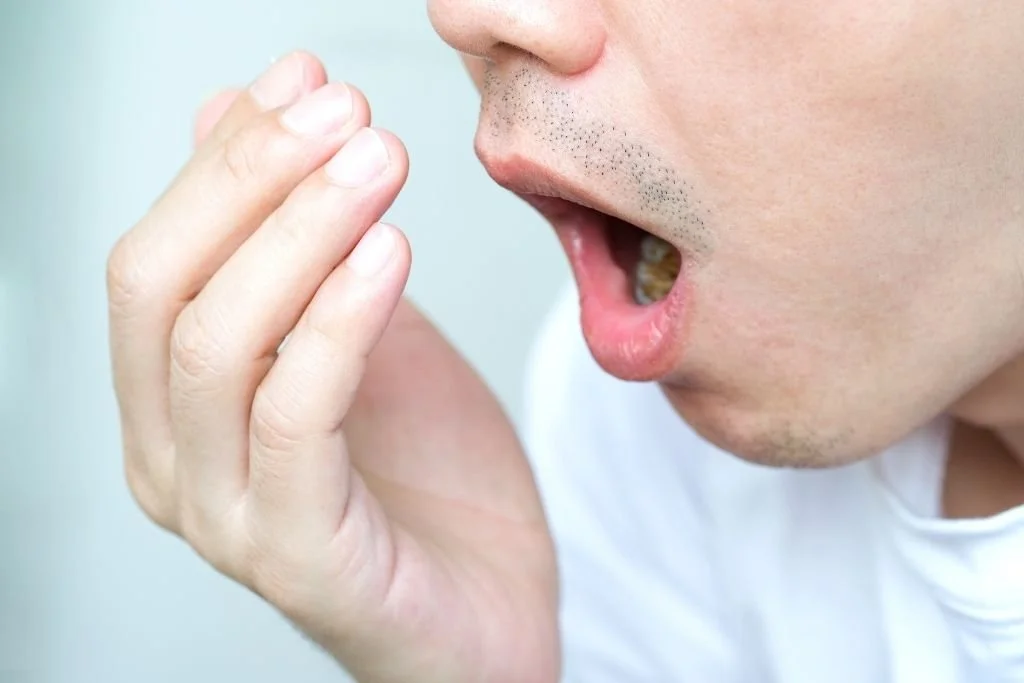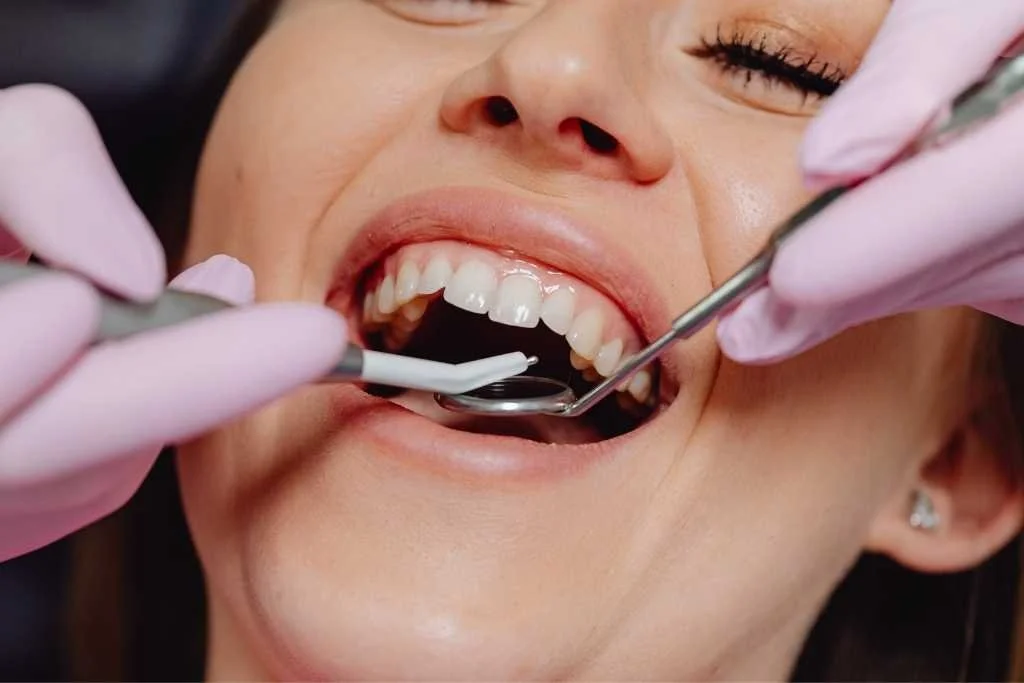GERD and Halitosis: How Acid Reflux Causes Bad Breath
What This Blog Post Will Cover
In this article, you’ll learn:
- How GERD and halitosis are linked through reflux and oral health changes
- Why acid reflux bad breath happens and how it differs from other chronic bad breath causes
- The latest research on the GERD oral health connection
- When to see a periodontist for halitosis or a bad breath specialist in NYC
- How to treat GERD-related bad breath with lifestyle changes, medical care, and professional periodontal treatment
Gastroesophageal Reflux Disease (GERD) and bad breath are two different health issues. However, they are more connected than many people think. GERD, or acid reflux, happens when stomach acid and food go back into the esophagus. This can cause heartburn, trouble swallowing, regurgitation, and a bad taste in the mouth.
Halitosis means having bad breath that lasts a long time. It often shows a health problem, not just poor oral care.
GERD and halitosis are different conditions. However, more evidence shows that GERD can cause bad breath. Patients often ask
Can GERD cause bad breath?
The answer is yes, and understanding this connection can help guide both oral and systemic treatment. This blog looks at the science behind the link between GERD and bad breath. It reviews recent studies and explains what this means for people looking for halitosis treatment in NYC.
What Is GERD?
GERD is a long-term digestive problem. It affects the lower esophageal sphincter (LES).
This is a ring of muscle that separates the stomach from the esophagus. When the LES weakens or relaxes at the wrong time, stomach acid can escape into the esophagus. This causes irritation and discomfort.
Common symptoms of GERD include:
Heartburn (a burning sensation in the chest)
Acid regurgitation
Chronic cough
Difficulty swallowing (dysphagia)
A sore throat or hoarseness
The sensation of a lump in the throat
Sour taste in mouth (GERD-related)
Persistent bad breath
GERD is widespread, affecting approximately 20% of individuals in the United States. Left untreated, it can cause complications such as esophageal damage, Barrett's esophagus, esophageal cancer, and GERD bad breath.
Understanding Halitosis
Halitosis, or chronic bad breath, extends beyond the occasional morning breath. Standard oral hygiene practices may not resolve a persistent condition. Volatile sulfur compounds (VSCs) typically cause halitosis by arising from bacterial protein breakdown in the oral cavity.
Common causes of halitosis include:
Poor oral hygiene and plaque build up
Periodontal disease (gum disease)
Xerostomia (dry mouth), sometimes medication-induced
Sinus infections or postnasal drip
Digestive disorders such as GERD
Tooth decay or infection
For many patients, GERD represents one of the overlooked chronic bad breath causes, especially when standard oral hygiene fails. That is why seeing a periodontist for bad breath in NYC is important. They can check both oral and stomach issues.
The Association Between GERD and Halitosis
Epidemiological Evidence
A large-scale study involving 2,588 patients found that 21.8% self-reported halitosis. The data showed a dose-response relationship. This means that the chance of bad breath from GERD increased with worse GERD symptoms. This was true for both patients with teeth and those without.
The association remained strong even after controlling for other gastrointestinal conditions, confirming a strong GERD oral health connection.
Biological Mechanisms
Postnasal drip and tongue coating: GERD can irritate the nasopharynx. This irritation leads to mucus buildup on the tongue. It also promotes bacteria that cause bad odors. This process contributes to GERD postnasal drip bad breath.
Reflux of gastric contents: Acid, gases, and food particles can reach the oral cavity, causing acid reflux bad breath.
Acid-peptic injury: Acid damage to tissues above the esophagus may contribute directly to oral malodor.
Strengths and Limitations of Current Research
While studies support a GERD–halitosis connection, some limitations exist:
Reliance on self-reported halitosis may introduce bias
Symptom-based diagnoses of GERD can lack precision
Residual confounding from other GI disorders is possible
The results from many studies support the idea that GERD is a real risk factor for ongoing bad breath.
Implications for Patients and Public Health
With obesity on the rise, a known risk factor for GERD, the prevalence of acid reflux bad breath may increase. For patients in NYC, doctors should consider GERD when diagnosing chronic bad breath. This is especially true if dental care does not fix the issue.
At our office in Midtown Manhattan, Dr. Froum treats halitosis. He focuses on oral causes and works with medical care for GERD. If you are looking for the best doctor for bad breath in NYC, a board-certified periodontist can help. They will check both your gums and any related health issues.
Managing GERD and Halitosis
A comprehensive management plan may include:
Lifestyle modifications
Avoid trigger foods (spicy, citrus, caffeine, chocolate)
Eat smaller, more frequent meals
Avoid eating within 3 hours of bedtime
Maintain a healthy weight
Elevate the head during sleep
These steps are often referred to as GERD lifestyle changes for halitosis
Oral hygiene
Brush and floss daily
Use antiseptic mouthwashes
Include tongue scraping
Seek professional cleaning if halitosis persists
Pharmacotherapy
Antacids for short-term relief
Proton pump inhibitors (PPIs) and H2 blockers for longer-term management
Hydration
Adequate fluid intake supports salivary flow and reduces odor
Medical or surgical management
Refractory GERD may require procedures such as fundoplication
Patients often ask: “How to treat GERD-related bad breath?” — in many cases, addressing reflux itself improves halitosis significantly.
Postnasal drip management
Antihistamines or decongestants if sinus issues are a contributing factor
Key Takeaways
GERD and bad breath are closely connected. Acid reflux can cause chronic bad breath. This happens when stomach acids and gases enter the mouth.
Acid reflux bad breath is different from other types of chronic bad breath. It comes from the digestive system, not just the mouth.
Common signs include a sour taste in the mouth, bad breath, and irritation in the throat or esophagus.
Treatment usually involves a combination of GERD lifestyle changes, medical therapy, and periodontal treatment for halitosis.
If you experience GERD bad breath or ongoing halitosis that does not respond to brushing and flossing, consult a bad breath specialist in NYC for advanced care.
Conclusion
A growing body of evidence demonstrates that GERD is strongly associated with both self-reported and clinically significant halitosis. The mechanisms linking GERD and bad breath include acid reflux, postnasal drip, and oral bacterial changes.
If you experience persistent bad breath in NYC, a sour taste in mouth (GERD-related), or symptoms unresponsive to routine dental care, consider consulting with a periodontist for halitosis . Dr. Scott Froum is a board-certified bad breath specialist in NYC, offering comprehensive diagnosis and treatment plans that address both gum health and gastrointestinal factors.
Frequently Asked Questions About Gerd and Halitosis
-
Yes. GERD allows gastric contents and gases into the mouth, causing acid reflux bad breath.
-
While not every case of halitosis results from reflux, many experts increasingly recognize GERD as a major contributor.
-
Treatment includes GERD management (medications, lifestyle adjustments) combined with professional periodontal treatment for halitosis.
-
A board-certified periodontist for bad breath, like Dr. Scott Froum, provides advanced care for oral and overall health.
About Dr. Scott Froum
Dr. Scott H. Froum is a board-certified periodontist in Midtown Manhattan. He helps patients with gum disease, dental implants, implant problems, and halitosis treatment in NYC.
Dr. Froum is a professor at SUNY Stony Brook Dental School and the chief editor of Perio-Implant Advisory. He has many years of experience saving natural teeth and treating chronic bad breath causes like GERD.
If you are looking for a bad breath specialist in NYC, Dr. Froum offers expert care that focuses on both your oral health and overall health.
Call 212-751-8530 or contact us today to learn more and schedule an appointment.
Contact Us
Address
1110 2nd Ave Ste 305
New York, NY 10022
Phone
Tel: 212-751-8530
Fax: 212-751-8544
scottfroumdds@gmail.com
Hours
Monday | 9am - 5pm
Tuesday | 9am - 5pm
Wednesday | 9am - 5pm
Thursday | 9am - 5pm
Friday | 9am - 5pm
Saturday | Closed
Sunday | Closed





